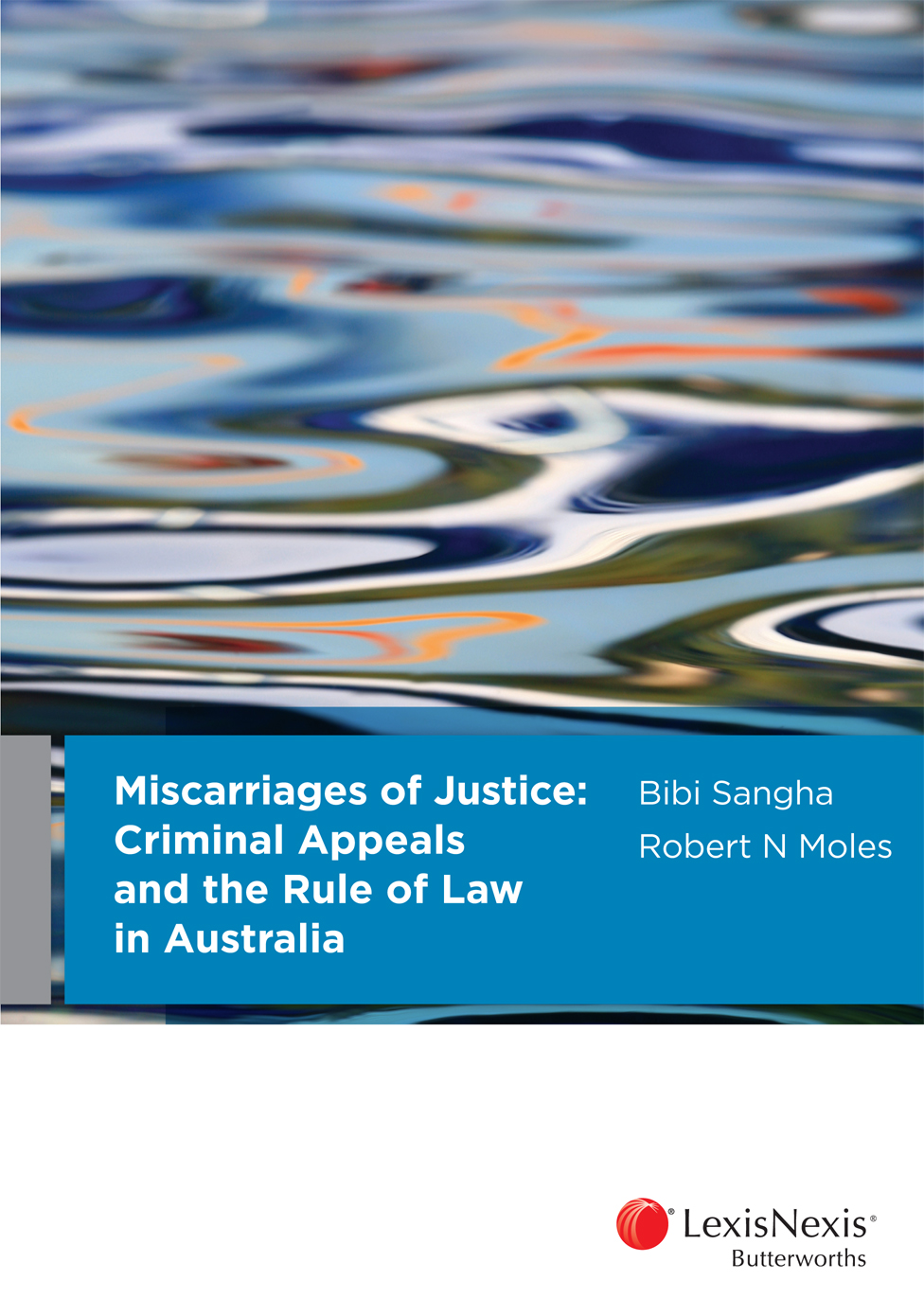Book review – Miscarriages of Justice: Criminal Appeals and the Rule of Law in Australia
15 December 2015 | Honourable Malcolm McCusker AC CVO QC
In his foreword to this thought-provoking book, the Honourable Michael Kirby AC CMG wrote:
"Practical individuals with conscience can sometimes help to change the world. Occasionally, they are lawyers."
Bibi Sangha and Bob Moles are lawyers and practical academics (not always an oxymoron), and they have what Kirby aptly describes as "a well targeted passion" for justice. By painstaking research and reason, they have exposed flaws in Australia's criminal justice system, and the resultant miscarriages of justice. The case they make for reforms is compelling - and their book makes compelling reading for everyone who believes, as an eminent jurist once put it, that
"Wrongful imprisonment is the nightmare of all free people. It cannot be accepted or tolerated."
Some have experienced that nightmare. Their stories make chilling reading. Anyone with a conscience would close the book, determined that something must be done. The authors show the way.
The main causes of wrongful convictions are identified, and recommendations made to reduce the chance of them being repeated – the dangers of "eye-witness" identification, often found to be wrong, albeit honestly made; the fallibility and subjective nature of "expert" evidence, in such areas as handwriting, fingerprints, time and cause of death; failure to disclose exculpatory information to the accused; false confessions; and faulty investigations.
The chapter on "Expert Witnesses" notes the role of expert evidence in criminal trials. It warns against too readily accepting "expert opinion" (which juries tend to accept as "gospel") and instances a number of cases in which faulty and unreliable "expert" evidence has resulted in a miscarriage of justice - Eastman, Chamberlain, Rendell, Wood, Gillham for example, and Keogh, who spent more than 18 years in prison after being convicted of the murder of his fiancée.
Keogh's conviction was based substantially on the "expert" evidence of a Dr Manock, whose evidence was later revealed to be "mere speculation".
He had unsuccessfully appealed against his conviction, in 1995. The discovery of Dr. Manock's lack of qualifications, and that his evidence at trial was not expert but "mere speculation", did not mean that Keogh could appeal again. It may come as a surprise to many that in every Australian State, however strong the evidence of a miscarriage of justice, there was no right to a second appeal (a judicial view the correctness of which the authors question). The only course open was to ask the Attorney-General to refer the case back to the Court of Appeal. That procedure was adopted from England more than 100 years ago; but in 1997, as a result of the exposure of scandalous miscarriages of justice suffered by the "Birmingham Six" and the "Guildford Four", the UK established an independent (CCRC) which took the decision on referral out of the hands of the Executive.
Since then, English Courts of Appeal have upheld appeals in 380 cases referred by the CCRC (a far greater number per annum than when referral was at the discretion of the Executive). Many of them were murder convictions (for which, in four cases, almost certainly innocent men had been hanged. But the Australian States made no changes.
Keogh petitioned the SA Attorney-General three times to refer his case back to the Court of Appeal to no avail.
To the authors, Bob Moles and Bibi Sangha (and others), it was clear that Keogh had been wrongfully imprisoned. They were shocked that Keogh's successive petitions had been rejected. Believing in the dictum, "Equity will not suffer a wrong to be without a remedy", they were instrumental in having a Private Member's Bill, to establish a Criminal Cases Review Commission, introduced in 2010. Their cogent arguments had the added support of the Australian Human Rights Commission. Unfortunately, on the recommendation of the SA Legislative Review Committee (LRC), that did not proceed. However, to the great credit of the South Australian Attorney-General of the time, the Honourable John Rau QC, the LRC, and the South Australian Parliament, legislation was enacted, which enabled a second appeal to be brought, directly to the Court of Appeal, instead of the old "petition procedure". Mr Keogh was at last able to have his appeal heard. It was promptly upheld, in December 2014.
Tasmania is now on course to enact similar legislation. The authors express the hope that the other states will follow. But that (as they explain) will not put an end to all their concerns. We must never be complacent or, although we have a good justice system, think that it is perfect.
This excellent book is eminently readable, with helpful comprehensive references and index. Judges, defence lawyers, prosecutors, police, forensic experts, academics, students, politicians, and law officers will undoubtedly find it absorbing, and a valuable guide and source of information about the criminal justice system; but it is also a book which everyone with a social conscience and an interest in justice will find enlightening, and the authors hope, will stir them into supporting the important reforms the authors advocate.
Miscarriages of Justice: Criminal Appeals and the Rule of Law in Australia is available here.
 LexisNexis
LexisNexis

